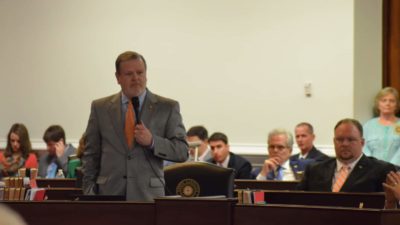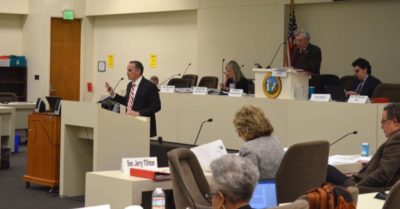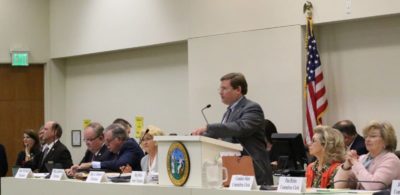
If you go on the EdNC legislative tracker right now, you will see at least 43 bills across the House and the Senate related to calendar flexibility for local school districts. I say “at least,” because it seems that new ones are being added all the time. By the time you read this, there will likely be more.
Some of the bills refer to specific counties, and others just call for blanket flexibility across the state.
The state mandates start and stop times for public schools. If a school is not year-round, it can’t start earlier than the Monday closest to August 26, and it can’t end later than the Friday closest to June 11.
If you’re not familiar with the subject, you’re probably wondering what I’m talking about. It’s simple, actually. The state mandates start and stop times for public schools. If a school is not year-round, it can’t start earlier than the Monday closest to August 26, and it can’t end later than the Friday closest to June 11. There are some exceptions granted, but that’s essentially the deal.
The legislation filed on the subject this session seeks to get around that mandate.
Sen. Tom McInnis (R-Richmond) filed a calendar flexibility bill for Anson, Richmond, Rowan, Scotland and Stanly Counties. But he said it’s not going to get any traction in the Senate.
“The hospitality and the hotel and travel industry is one of the most powerful lobbies in North Carolina,” he said. “And if you do something to affect them or what they perceive to be affecting them, the wailing and gnashing of teeth as quoted in the Holy Bible will come out.”
According to WRAL.com, Sen. Tom Apodaca (R-Henderson) said such legislation won’t get a hearing in the Senate at all. He is the chairman of the Senate Committee on Rules and Operations of the Senate, which controls how legislation goes through the Senate.
Rep. Craig Horn (R-Union) is for local flexibility, but agrees that these bills aren’t going to pass. He is one of the chairmen of the House K-12 Education Committee, where the House bills on the subject are sitting. And he says he is the impediment to their movement.
“I’m holding every one of them,” he said. “They’re not going anywhere, they’re in my pocket.”
He said that is because he came to the General Assembly to pass good legislation, and he can’t get these passed.
“If I can’t get good legislation passed into law, I’m not just going to wiggle and jump for the sake of wiggling and jumping,” he said.
[Horn] says he wants to find a compromise that works for everybody on all sides of the issue.
He says he wants to find a compromise that works for everybody on all sides of the issue. Until then, the issue is likely a dead one.
This is an important issue to many local districts and to organizations like the North Carolina School Boards Association, the John Locke Foundation, and the North Carolina Justice Center — all members of a coalition called L.O.C.A.L., which stands for Let Our Calendar Authority be Local. Take note, the last two organizations I mentioned are usually seen as existing on opposite ends of the ideological spectrum, but on this issue they agree.
So why do all these folks want local calendar flexibility? There are a host of reasons, including the geographical diversity of the state.
We have mountains and beaches, lakes and parks. It’s one of the great things about life in North Carolina. But it also means that inclement weather affects different districts in drastically different ways. One standard statewide calendar doesn’t fit all the variables districts face. When it snows, Asheville students can end up missing a lot of school while Wilmington students may miss none. Every year, districts have the unenviable task of finding ways to make up for those missed days. In extreme cases, that can mean school on Saturdays or even during spring break. With calendar flexibility, proponents say schools can build in the snow days to the educational year, sparing students the horror of these unexpected make-up days.
We will have columns this week from two principals touching on this problem.
With calendar flexibility, proponents say schools can build in the snow days to the educational year, sparing students the horror of these unexpected make-up days.
Another issue is alignment with community college and university schedules. Students in high school often have the opportunity to take higher education classes. But the calendars don’t necessarily match up, and that can lead to scheduling difficulties for students.
And then there are exams. Proponents of local calendar flexibility don’t see the logic of students who take first semester exams being forced to do so after winter break — a problem created by the standard state calendar. Are those students really studying over the holidays? If not, that means students come back to school having lost a certain amount of the knowledge gained during the school year. That can mean worse grades, disappointed students and upset parents.
We will have a column this week from a high school student that addresses these last two concerns.
“…if we had a flexible calendar or a different calendar, we could improve reading achievement by at least a year…”
Parallel to the winter break issue is the problem of summer learning loss. That is the education that students lose during the long summer break when they’re not in classrooms.
State Superintendent of Public Schools June Atkinson said students who go on summer break and don’t have educational reading opportunities during the summer can lose anywhere from two and a half to three months of reading progress.
“When you combine that from kindergarten through grade 3, that means that those students are behind at least one year,” she said. “And if we had a flexible calendar or a different calendar, we could improve reading achievement by at least a year with other things remaining constant.”
An article from the Wilmington Star-News on Snipes Academy of Arts & Design in New Hanover County illustrates Atkinson’s point. The school is moving to a year-round schedule in the 2016-17 school year, becoming the first magnet school in New Hanover County to do so.
The school found that 49 percent of its K-5 students were proficient in math when they left for summer break in June 2014. When they came back in September, only 9 percent were proficient. Reading scores also declined, from 64 percent before summer to 42 percent after.
As Sen. McInnis mentioned earlier in this article, the tourism industry is the main impediment to addressing problems like this through local calendar flexibility. The tourism industry relies on the summer vacation season for its success. Businesses in that industry worry that if schools change their schedules, it could cut into the vacation season and their profits. Of course, legislators don’t want to make them mad. That’s neither surprising nor malevolent. Business is important to the state’s vitality. So tourism is a powerful lobby. And it looks like for now, it will get its way.
Keep your eye out this week for contributor columns on this issue. Let us know what you think and whether you want the legislature to take this issue up this session.




